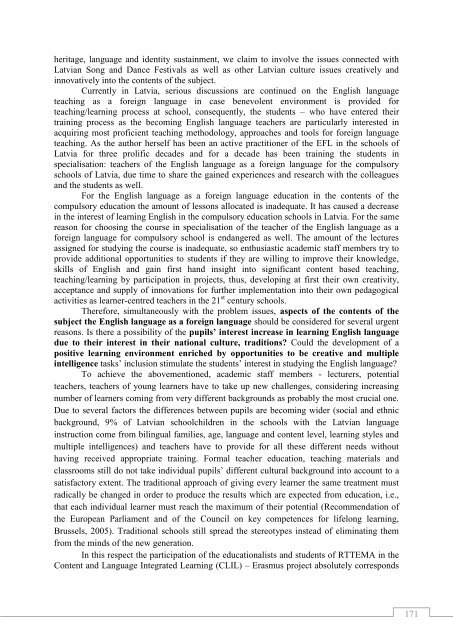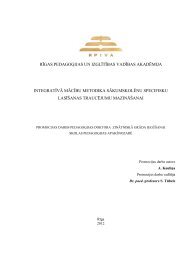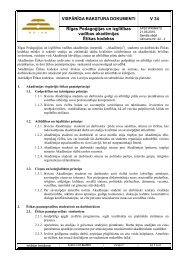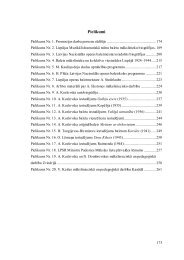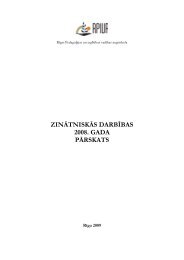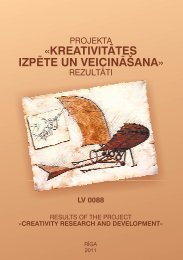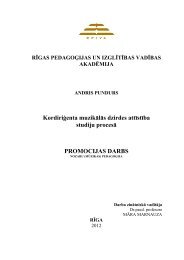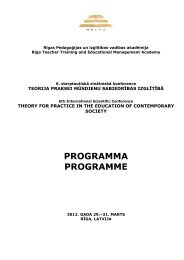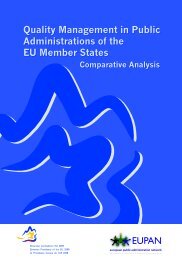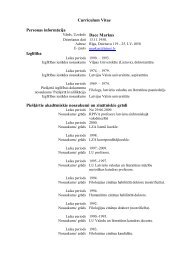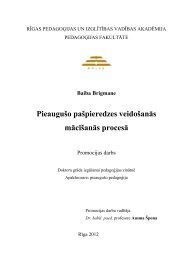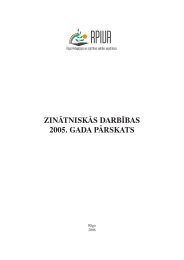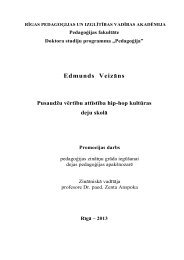You also want an ePaper? Increase the reach of your titles
YUMPU automatically turns print PDFs into web optimized ePapers that Google loves.
heritage, language and identity sustainment, we claim to involve the issues connected withLatvian Song and Dance Festivals as well as other Latvian culture issues creatively andinnovatively into the contents of the subject.Currently in Latvia, serious discussions are continued on the English languageteaching as a foreign language in case benevolent environment is provided forteaching/learning process at school, consequently, the students – who have entered theirtraining process as the becoming English language teachers are particularly interested inacquiring most proficient teaching methodology, approaches and tools for foreign languageteaching. As the author herself has been an active practitioner of the EFL in the schools ofLatvia for three prolific decades and for a decade has been training the students inspecialisation: teachers of the English language as a foreign language for the compulsoryschools of Latvia, due time to share the gained experiences and research with the colleaguesand the students as well.For the English language as a foreign language education in the contents of thecompulsory education the amount of lessons allocated is inadequate. It has caused a decreasein the interest of learning English in the compulsory education schools in Latvia. For the samereason for choosing the course in specialisation of the teacher of the English language as aforeign language for compulsory school is endangered as well. The amount of the lecturesassigned for studying the course is inadequate, so enthusiastic academic staff members try toprovide additional opportunities to students if they are willing to improve their knowledge,skills of English and gain first hand insight into significant content based teaching,teaching/learning by participation in projects, thus, developing at first their own creativity,acceptance and supply of innovations for further implementation into their own pedagogicalactivities as learner-centred teachers in the 21 st century schools.Therefore, simultaneously with the problem issues, aspects of the contents of thesubject the English language as a foreign language should be considered for several urgentreasons. Is there a possibility of the pupils’ interest increase in learning English languagedue to their interest in their national culture, traditions? Could the development of apositive learning environment enriched by opportunities to be creative and multipleintelligence tasks‘ inclusion stimulate the students‘ interest in studying the English language?To achieve the abovementioned, academic staff members - lecturers, potentialteachers, teachers of young learners have to take up new challenges, considering increasingnumber of learners coming from very different backgrounds as probably the most crucial one.Due to several factors the differences between pupils are becoming wider (social and ethnicbackground, 9% of Latvian schoolchildren in the schools with the Latvian languageinstruction come from bilingual families, age, language and content level, learning styles andmultiple intelligences) and teachers have to provide for all these different needs withouthaving received appropriate training. Formal teacher education, teaching materials andclassrooms still do not take individual pupils‘ different cultural background into account to asatisfactory extent. The traditional approach of giving every learner the same treatment mustradically be changed in order to produce the results which are expected from education, i.e.,that each individual learner must reach the maximum of their potential (Recommendation ofthe European Parliament and of the Council on key competences for lifelong learning,Brussels, 2005). Traditional schools still spread the stereotypes instead of eliminating themfrom the minds of the new generation.In this respect the participation of the educationalists and students of RTTEMA in theContent and Language Integrated Learning (CLIL) – Erasmus project absolutely corresponds171


